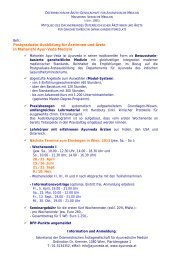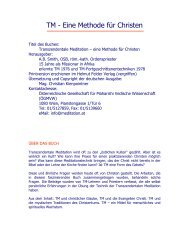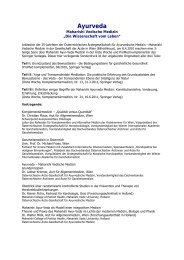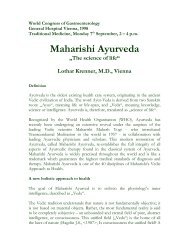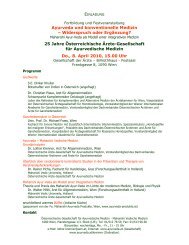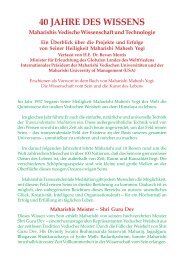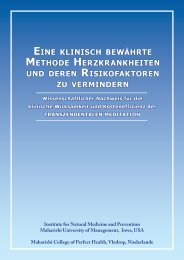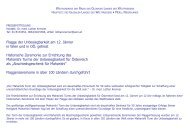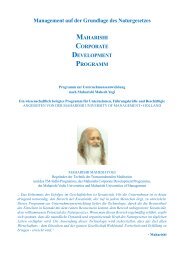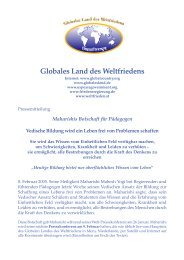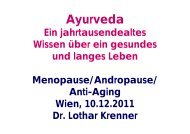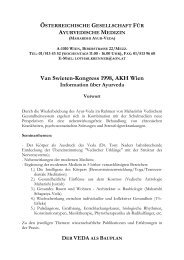Summary of Research Findings
Summary of Research Findings
Summary of Research Findings
You also want an ePaper? Increase the reach of your titles
YUMPU automatically turns print PDFs into web optimized ePapers that Google loves.
<strong>Research</strong> on Physiological Effects (continued)<br />
4-supplemented rabbits. The mechanism <strong>of</strong> action may be prevention <strong>of</strong> lipid and protein oxidation by MAK-4.<br />
Study 1 <strong>Research</strong> Highlights<br />
Wanatabe Heritable Hyperlipidemic rabbits fed MAK-4 for 6 months showed significantly increased glutathione<br />
peroxidase activity, mean corpuscular hemoglobin concentration and superoxide dismutase, as<br />
compared with the control group. These findings suggest prevention <strong>of</strong> organ damage in the MAK-4 supplemented<br />
rabbits, which may be due to prevention <strong>of</strong> lipid and protein oxidation by MAK-4.<br />
2. Title<br />
Subjective Survey, Blood Chemistry and Complete Blood Pr<strong>of</strong>ile <strong>of</strong> Subjects Taking Maharishi Amrit Kalash<br />
(MAK)<br />
Publication<br />
Federation <strong>of</strong> the American Societies for Experimental Biology Journal, Vol. 5, No. 5, p. A1317, 1991 (Abstract).<br />
Authors<br />
K.S. Blasdell,* H.M. Sharma,** P.F. Tomlinson, Jr.,* and R.K. Wallace.*<br />
Conducted at<br />
**Maharishi International University, Fairfield, IA 52556<br />
**Ohio State University, Columbus, OH 43210<br />
<strong>Summary</strong><br />
Psychophysiological changes are reported in subjects regularly taking MAK (MAPI, Inc., Lancaster, MA), an<br />
herbal food supplement demonstrating antineoplastic, antioxidant and anti-aging activities in animal and in invitro<br />
studies. Six hundred fifty-nine subjects (age 41+9, taking MAK 22+11 mos) reported substantial benefits<br />
in 19 psychophysiological indices, e.g., increased resistance to illness 87%; happiness 84%; energy 78%; tranquility<br />
83%; mental clarity and emotional balance 80%. Remaining subjects noted no change or condition worsened,<br />
< 1%. A substantial percentage <strong>of</strong> previous sufferers (46 on medical treatment) reported benefits on 21<br />
illnesses, e.g. colds 94% improved or eliminated, n=209; PMS 84%, 120; constipation 87%, 245; hay fever 81%,<br />
118; headaches 78%, 148; fatigue 88%, 249; asthma 82%, 28; cancer 90%, 10; rheumatoid arthritis 73%, 22; autoimmunity<br />
100%, 10. Only 3% (n=22) reported minor complaints, e.g. bad taste; sugar rush; upset stomach; and<br />
diarrhea. Blood chemistry (24 values) and complete blood pr<strong>of</strong>ile in 82 separate volunteers showed no abnormal<br />
findings associated with MAK intake. Substantial benefits indicate that MAK may be valuable as a preventive<br />
agent, a therapeutic adjunct and a safe candidate for clinical trials.<br />
Study 2 <strong>Research</strong> Highlights<br />
Data from 659 human subjects showed that regularly taking MAK carried substantial benefits in 19 psychophysiological<br />
indices and on 21 illnesses, with no abnormal effects, as evaluated by blood chemistry and<br />
complete blood pr<strong>of</strong>iles. Therefore, MAK may be valuable as a preventive agent, a therapeutic adjunct and a<br />
safe candidate for clinical trials.<br />
78



